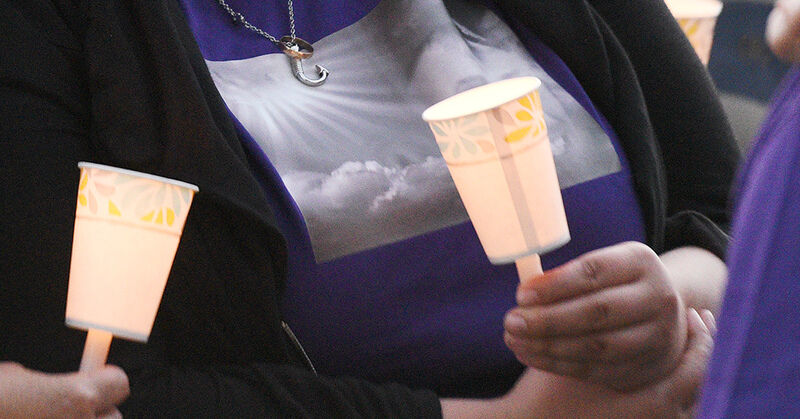WEIGHING IN - In the three years that New York has offered its first-in-the-nation, “recovery-friendly workplace tax credit,” the state could have given away a total of $6 million.
But out of the $6 million available to qualified for-profit employers since the credit was created in 2019, the state has given away just $6,000.
"That's how much this is not being taken advantage of," said Dean Hale, a training specialist with the New York State Office of Addiction Services and Supports, whose job includes processing the tax-credit applications.
It’s an application process Hale said can be completed in under 10 minutes.
The goal of the tax credit, with $2 million available statewide per year, is to help reduce stigma around addiction, offering financial incentive for employers to hire workers who are in recovery from substance use disorders. The up to $2,000 per year for each qualified new hire in recovery is meant to make the idea of a “recovery-ready” or “recovery-friendly” workplace more ubiquitous across New York.
That was also the goal of the inaugural Recovery Ready Workplace New York Symposium, put on by the New York State Coalition to Prevent Addiction and Support Recovery in Employment earlier this month in Albany.
That symposium was where Hale made his remarks about the tax credits, which I later verified with OASAS.
And while the name of the coalition composed of mental health specialists, researchers, policymakers and others is a mouthful, its mission is fairly uncomplicated. The coalition, which formed in February of 2022, wants to foster a workplace culture in New York that supports, rather than shuns, people who are in recovery from substance use disorder.
It would be a significant cultural shift, but it’s one that is already proving to make inroads on substance use disorders afflicting our nation.
Recovery-friendly workplaces are not only meant to benefit those in recovery, they are meant to benefit employers, too, by helping workplaces retain workers. Between 2009 and 2015, nearly 226,000 New Yorkers were unable to work due to opioids, translating to $179.4 billion in lost economic output, according to the American Action Forum, a center-right think tank.
But unless more employers embrace the concept, the recovery-friendly workplace idea won’t take off in New York, even as more than half of all states have undertaken similar initiatives.
Maybe it’s simply that $2,000 isn’t enough incentive to some employers — it probably isn’t. Regardless, the fact that the state has only given away a thousandth of its allotted “free money” in the form of tax credits is a clear indicator of just how much more advocacy is needed.
Hopefully, the inaugural state Recovery Ready Workplace conference that included representatives from both the New York State Department of Health and the National Institutes of Health can help the concept of recovery-ready workplaces gain momentum.
Simply put, the coalition needs more Mike Carpenters.
Carpenter is president of The Northeast Group, a distribution company that he describes as a microsize version of Amazon based in Plattsburgh that employs between 60 and 120 people, depending on the season.
Carpenter has been running what amounts to a recovery-ready workplace since the mid-1990s – long before the concept even existed. And he’s one of the few business owners to have taken advantage of the recovery-ready tax credit.
His employment philosophy came out of his own addiction, which included multiple arrests on drug charges and DWIs when he was in his 20s and early 30s.
After completing treatment at the Conifer Park rehabilitation center in Glenville in 1989, Carpenter said, he was finally able to stay sober.
As he was looking for work, “I realized how difficult it was even to prepare a resume because I had huge gaps in time when I didn’t work,” Carpenter told me by phone following the symposium. “So you’re trying to change your life and live this honest lifestyle, but you’re walking into employers and kind of lying to them about your history so that they will hire you.”
After the New York congresswoman's viral questioning of college presidents, will she change her own messaging?
So when he took over the family company, he and his team decided they’d hire people like them – people in recovery.
“We were struggling to find workers. We didn’t think of it in terms of ‘giving them opportunity.’ We were just like ‘if they are good workers like us, we’re probably going to have a good business.’”
Decades later, Carpenter runs a profitable company where the majority of people he employs are in recovery.
“We’re embracing recovery. We’re not shying away from it, we’re not telling people ‘you did something wrong and you should keep it to yourself,’” he said.
Few seem to doubt that substance use disorder is a major issue, with the opioid epidemic continuing to explode. Between 1999 and 2021, nearly 645,000 people died of opioid overdose, according to Centers for Disease Control data. Startlingly, the number of people who died from drug overdose overall in 2021 was six times greater than 1999’s figure.
In New York, there were 4,233 overdose deaths in 2020 – four times the 1,074 such deaths in 2010, state numbers show. And in one particularly bad rash of deaths in Schenectady, eight people died of suspected overdoses in a span of eight days in July.
Yet, even as people accept that addiction – and specifically opioid addiction – is an urgent health crisis, far fewer seem willing to accept that workplaces can provide critical support.
Work is central to people’s lives. It’s where many of us spend the majority of our waking hours, it’s how we support ourselves financially and it often offers a source of purpose. For all of those reasons, having a job can help someone in recovery stay out of active addiction.
“Why do we need recovery-ready workplaces? Because people need that support to maintain recovery from addiction,” Theresa Knorr, the director of Recovery Education and Training at Friends of Recovery New York, said during the symposium.
Yet our society tends to view addiction as a problem that can be bandaged up and then forgotten, rather than as a lifelong illness that must be managed like any other chronic disease.
We seem to want to bury the fact that 1 in 12 workers has a substance-use disorder, according to the National Safety Council, with professions such as construction and service work having an even higher incidence.
We want to pretend that workplaces really can be “drug free,” rather than acknowledging that more than 10 million people with addiction have full-time jobs, according to the Substance Abuse and Mental Health Services Administration.
Rather than sweeping addiction under the company carpet, recovery-friendly workplaces approach addiction more openly. Instead of avoiding hiring employees who are in recovery from addiction, a recovery-ready workplace may go out of its way to hire people in recovery. That workplace would also commit to supporting people in recovery.
For Carpenter’s Northeast Group, being recovery ready means connecting people in recovery with doctors and transportation and regularly accommodating employee’s appointments with counselors or medication-assisted treatment providers.
“We’re working around the people who are in recovery, around their schedules and giving them time off, but we’re not giving them less responsibility,” Carpenter said.
The company does this by being outcomes-focused. Say every employee is responsible for processing 100 pieces. Some may accomplish this in an eight-hour shift, others may have to break up the day.
The flexible and welcoming culture helps Carpenter attract and keep employees, and it helps the employees who are in recovery stay out of active addiction, which, in turn, makes them better employees, Carpenter said.
According to the U.S. Department of Labor, workers in active addiction take nearly twice as many days of unscheduled leave compared to other workers and have an average annual turnover rate that’s 44% higher. Workers in recovery, by contrast, average nearly 10% fewer days of unscheduled leave per year than the average worker, and their turnover rate is 12% below the overall average.
The New York Prevent Addiction and Support Recovery in Employment coalition has drafted legislation, which is expected to be introduced next year, that aims to provide a structure and resources to support recovery-ready workplaces. Part of the goal is standardizing what it means to be a recovery-friendly workplace in New York.
In all of this, the coalition is advocating for more support, including from labor groups and private employers.
Encouragingly, labor groups seem receptive.
“The union movement has long led the fight to assist workers struggling with addiction both through direct services, as well as our contracts and statute. Recovery-ready workplace legislation has the potential to be an important step in that tradition,” Mario Cilento, president of the New York State AFL-CIO, responded to me in a written statement. “We look forward to reviewing the legislation when it is introduced and discussing it with our affiliated unions.”
But in addition to labor, the coalition will need the support of private companies, and it was telling that only a handful of attendees at this month’s symposium were employers.
Carpenter doesn’t think every workplace needs to be a recovery-ready workplace. But Carpenter does think more businesses should embrace the concept, especially as unemployment rates drop and companies struggle to hire.
“It’s a pool of people that you might not otherwise think of,” Carpenter said.
Carpenter finds that, with support, people in recovery often make even better employees than people not in recovery because they are motivated and grateful.
So in the end, even if being a recovery-friendly workplace is driven primarily by a desire to show compassion and help, Carpenter doesn’t do it entirely out of the goodness of his heart.
“Maybe it sounds like I’m noble, but it’s self-serving on some level,” he told me. “Because the more [employees] are healthy when they are not at work, the better employee they are going to be when they are at work.”
That’s more or less Carpenter’s pitch when he tries to sell other New York business owners on recovery-friendly practices.
Plus, he makes a point of mentioning the tax credits.















